Introducing Convoy for Brokers
Brokers, Convoy News • Published on November 18, 2021
Today we’re excited to announce the next step in Convoy’s growth and evolution as the nation’s leading digital freight network. Over the last six years, we’ve built a unique fleet of owner-operators and small carriers that now number more than 300,000 trucks across the US, all connected through the Convoy app. Based on feedback from these carriers over the last year and partnerships with forward-looking capacity providers, we’re now opening up our digital freight network to truckload brokerages—establishing a new model for how brokers and digital freight networks can work together for the betterment of carriers, shippers, and the environment.
The new program is called Convoy for Brokers. It enables brokerages to post loads directly to our digital freight network, access our elastic capacity, and expand their carrier base while maintaining their relationships with shippers and carriers and ensuring the privacy of their data. For carriers in our network, the new program expands opportunities—providing access to more loads in our app so that they can fill their schedules, increase earnings, and reduce empty miles.
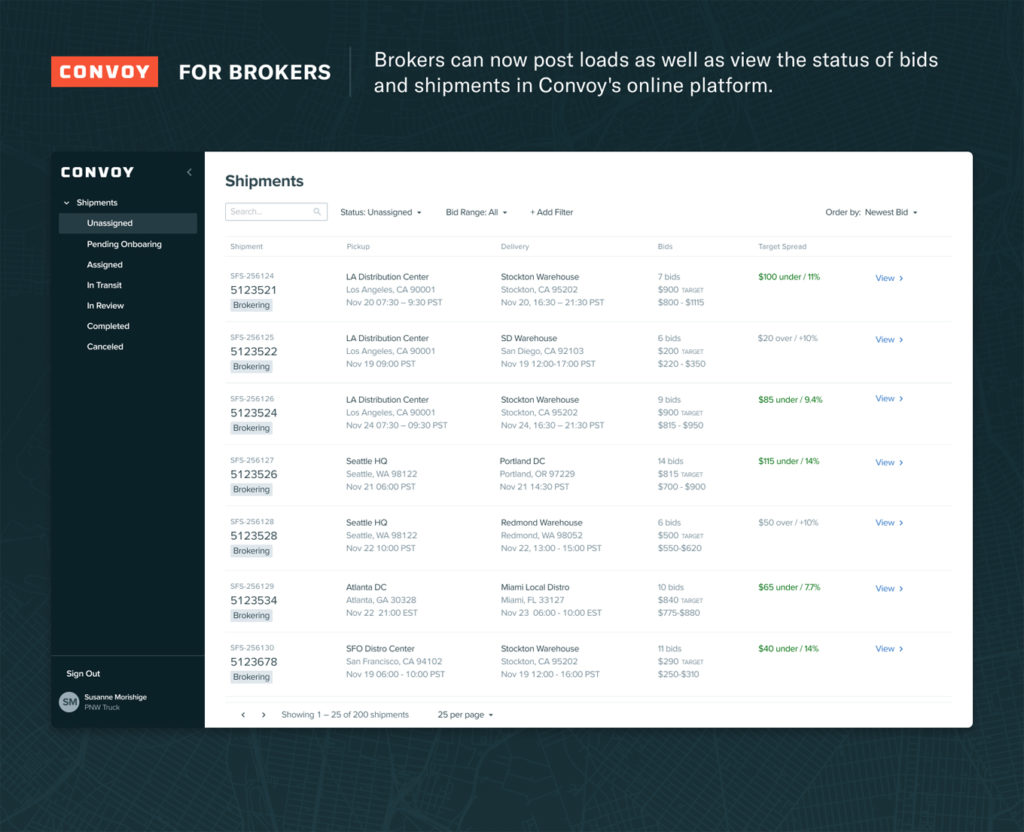
Today’s announcement is part of our commitment to building a future of freight based on collaboration and transparency. We believe that carriers, brokerages, and shippers working together is the foundation of a healthier, more resilient supply chain that benefits all parties involved.
We’d like to share a bit more about the market dynamics and discussions we’ve had over the last 18 months that led to today’s announcement, and provide an overview of the new program and its benefits.
Brokers: The Challenge of Efficiently Accessing High-Quality Capacity
There are more than 18,000 registered freight brokers across the US, and every one provides a critical logistics service—arranging for trucking companies to haul shipments for businesses of all sizes. When you account for independent brokers as well as brokerage arms of asset-based carriers, upward of 43% of truckload shipments are currently run through brokered transportation.1
With all the market volatility over the last 18 months, brokers have become even more important. Their relationships with carriers provide shippers with flexible capacity to handle fluctuations in demand, often with short notice.
Brokers have faced challenges, however, when it comes to how quickly they can access supply and how effectively they can manage quality control within their carrier base:
- Efficiency – Brokering loads often involves hours of back-and-forth emails and phone calls with multiple carriers. This limits broker productivity, and as lead time is consumed by manual activity, truck costs increase.
- Quality control – Brokers often operate with limited information about the safety and performance of their carrier base. Even when the information is available, it quickly becomes outdated. This increases their risk of customer service issues and cargo claims.
Another headwind brokers have faced over the last 18 months is the imbalance of supply and demand. In many industries and metros across the US, the supply of trucks has been outpaced by surging demand—this leaves many brokers struggling to find capacity and results in a higher incidence of service failure.
In our conversations with brokerages, what we’ve heard is that they need a more efficient way to secure high-quality capacity.
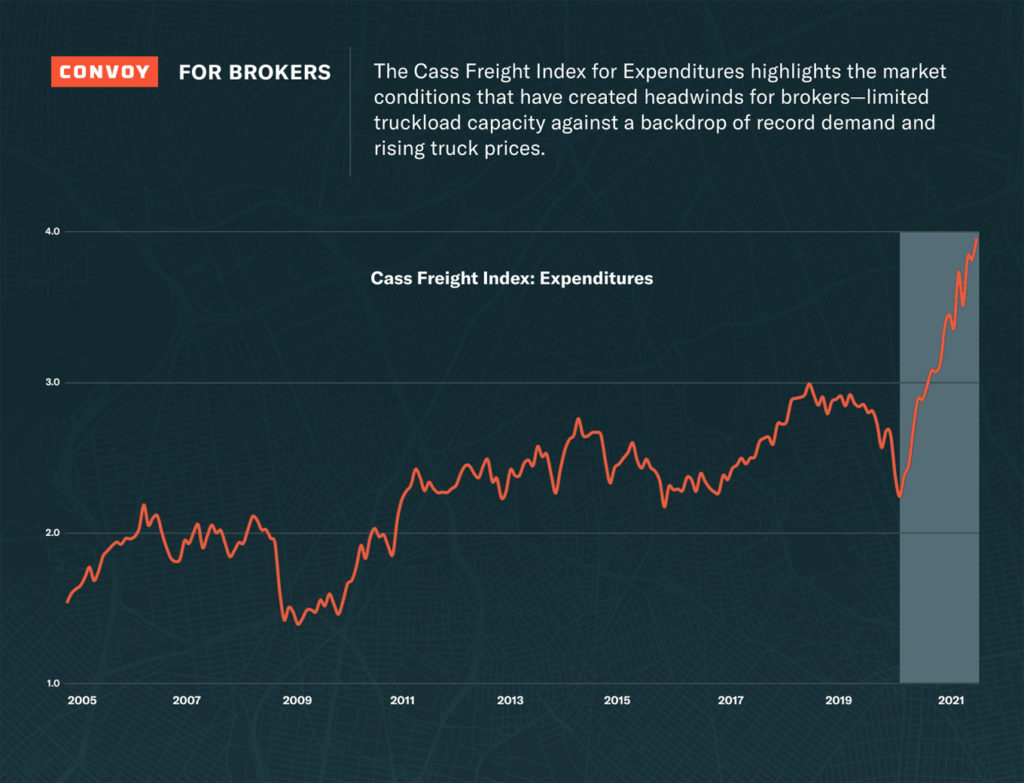
Carriers: The Need for Additional Flexibility
Owner-operators and small carriers are the lifeblood of the American supply chain. Truck driving is the #1 job in 29 states, and the vast majority of the 3 million trucks running freight in the US are owned by these small fleets and independent drivers.
Over the last half-decade, Convoy has had the privilege of working with tens of thousands of small carriers, providing them with access to high-quality loads that they wouldn’t otherwise have access to. Through our machine learning technology, we help keep carriers’ schedules and trucks full by automatically finding backhauls to match their headhauls—improving fleet utilization and helping carriers earn more to grow their business.
Yet even with thousands of loads running through our network every day, there’s still more we can do to help carriers more efficiently run their business and maximize truck utilization—on a schedule that works best for them and on the lanes they like to run.

Introducing Convoy for Brokers
Based on feedback from the carriers in our network, we started to explore partnerships with truckload brokerages that could bring additional shipment volume into our network. And through discussions with the forward-thinking team at USA Truck, we began work just over a year ago on a new technology solution for brokers that could address their needs for efficiency and quality. Over the last year, we’ve piloted the solution with USA Truck and many other freight providers. Today, we’re making the solution available to brokers nationwide.
Convoy for Brokers consists of three things:
- An online platform where brokerages can post their loads and manage incoming bids.
- TMS integrations that enable brokers to book and manage loads using their existing tools and processes.
- A pay-as-you-go pricing model with zero upfront costs. Brokers are only invoiced after loads are successfully booked—there are no additional subscription or posting fees.
Brokers directly manage their shipper and carrier relationships – in other words, they remain the broker of record on the loads they run with carriers in our network. Convoy’s technology and digital freight network simply facilitate the process—automating the matching of loads to trucks as well as carrier payment.
Below is an overview of how the program works.
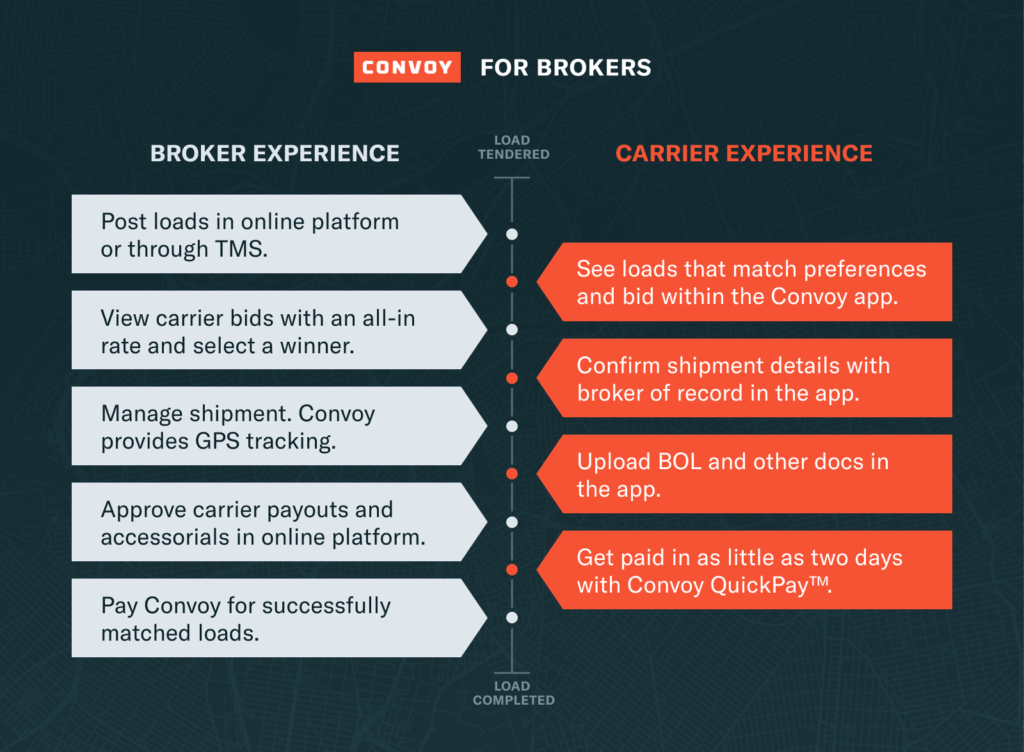
Convoy for Brokers helps truckload brokerages cover more loads by expanding their carrier base, and it saves them time and money through automation of the brokerage process and competitive bidding on their loads. For carriers, the introduction of brokers into our digital freight network translates into more loads on more lanes, while still getting the benefits they’ve come to expect from Convoy, including hassle-free detention, in-app lumper codes, facility insights, and two-day QuickPay™.
These benefits are enabled through five technology and business model innovations.
First, through our online platform, we enable brokers to match their loads at scale. As soon as they post a load into our network, they can see the bids as they come in through a user-friendly dashboard. Brokers get full control over the carrier they select to run their loads, and they can confirm loads in as little as 3 minutes. This enables them to flex their capacity much more quickly as their customers’ demand fluctuates.
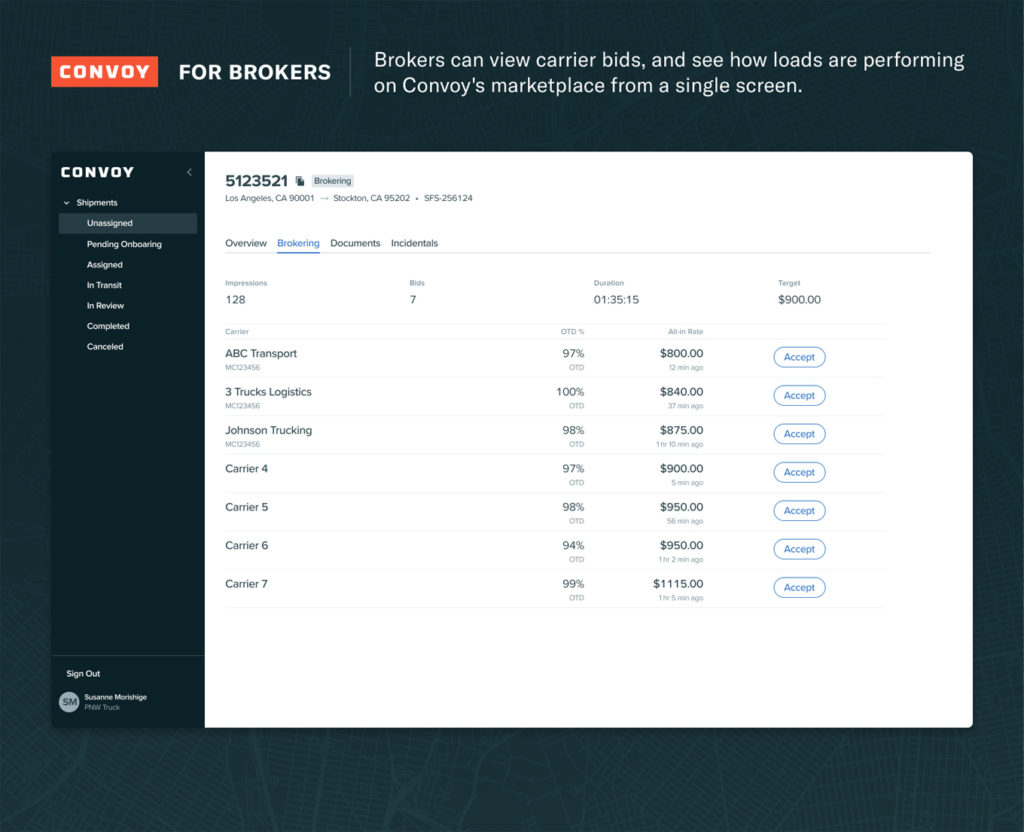
Second, our pre-qualified carrier network provides brokers with capacity that they and their shippers can trust. Our industry-leading carrier safety standards use data and machine learning models to ensure that every load is hauled by an extensively vetted, high-quality carrier. The result is a crash rate 16% lower than the industry and a cargo-claims rate 20x lower.
Third, Convoy for Brokers provides industry-leading shipment visibility. With more than 95% of loads in our network consistently connected through our carrier app, brokers can see the precise location of their shipments on a map and share this information with their customers.
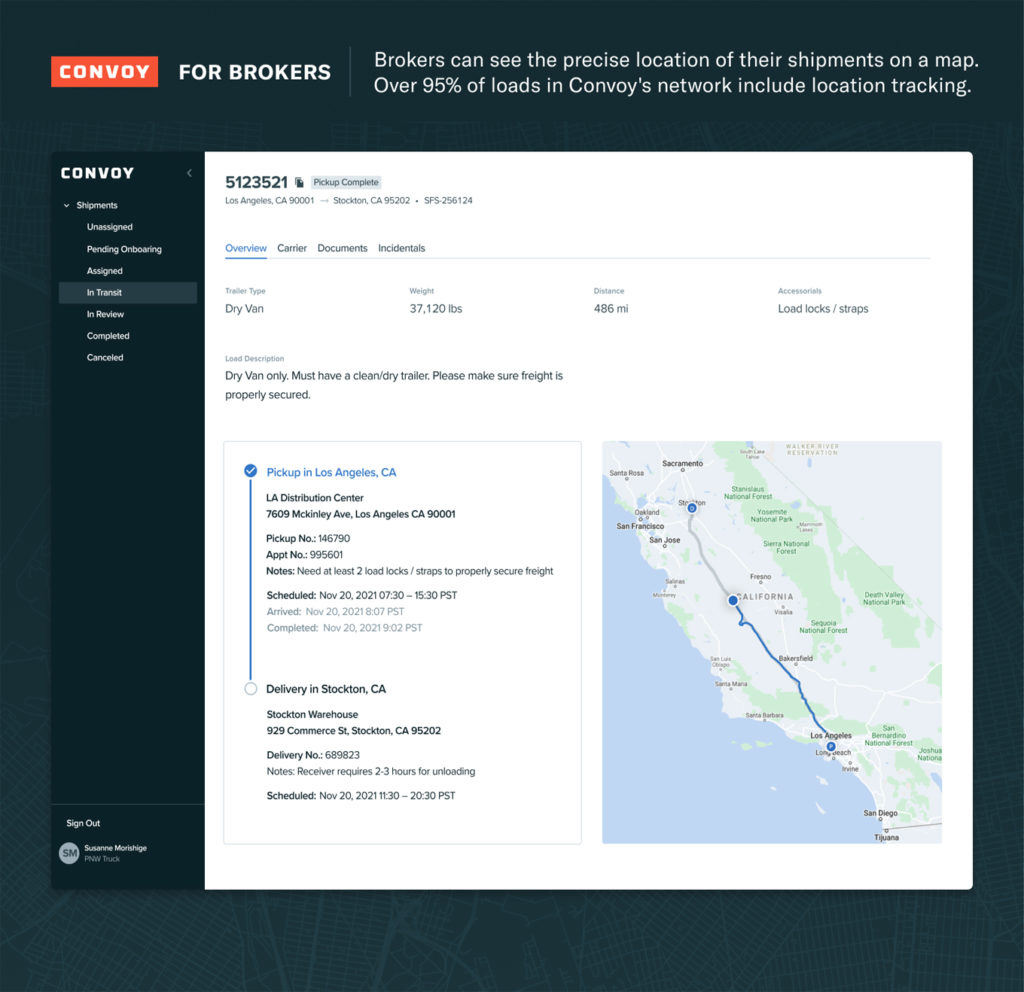
Fourth, we automate the document management process. Brokers can eliminate manual paperwork with online access to shipment documents, including BOLs, proof of delivery, and inventory photos, which can all be uploaded directly from Convoy’s carrier app.
Finally, we automate carrier payment. Through Convoy QuickPay™, carriers can get automatically paid in two days with no hidden costs and no additional paperwork.
The Future of Freight is Built on Collaboration and Transparency
Our mission at Convoy is to transport the world with endless capacity and zero waste. This isn’t an aspiration that we can ever hope to achieve on our own. Instead, it requires cross-industry collaboration and transparency to a degree that hasn’t traditionally existed in freight logistics.
That’s why we’re so grateful for the tight collaboration with the team at USA Truck. Their hard work and commitment to piloting new technology and approaches was an important catalyst for today’s announcement. George Henry, Senior Vice President at USA Truck, put it best:
“While there are some areas where we compete with Convoy, there’s more opportunity for both of us when we work together. Convoy for Brokers complements our existing truckload offering—it’s helped us support additional growth in our load volume and increase the productivity of our team by making it easier to access trucks through Convoy’s digital freight network.”
Through our work together, we’ve been able to accelerate the program over the last year and forge partnerships with other forward-looking brokerages like AFS Logistics and many others. Our efforts to date have been a model for how freight industry collaboration can benefit all parties—carriers, shippers, and brokers—and we’re excited for the opportunity to build new relationships with additional brokers in the months ahead.
If your brokerage could benefit from more efficient access to a massive, high-quality fleet, we invite you to learn more about Convoy for Brokers at convoy.com/brokers.
1 Convoy analysis of U.S. Census Bureau, Economic Census, 2017 industry revenue statistics.

Brooks McMahon
Brooks McMahon is Vice President of Partnerships at Convoy, where he and his team are responsible for developing and growing strategic partnerships, and helping launch and develop new initiatives. Previously, Brooks served in a variety of senior management roles at companies including Marchex and Getty Images. Brooks earned an MBA from the University of Washington and a BS from Santa Clara University.

Madhu Dutta
Madhu Dutta is Director of Engineering at Convoy, where she and her teams are responsible for Convoy’s emerging technology products. Previously, Madhu served in a variety of senior technology roles at Capital One, Amazon and Microsoft. Madhu holds an executive MBA from the Quantic School of Business and Technology and a Bachelor’s degree in Computer Engineering from University of Toronto.



